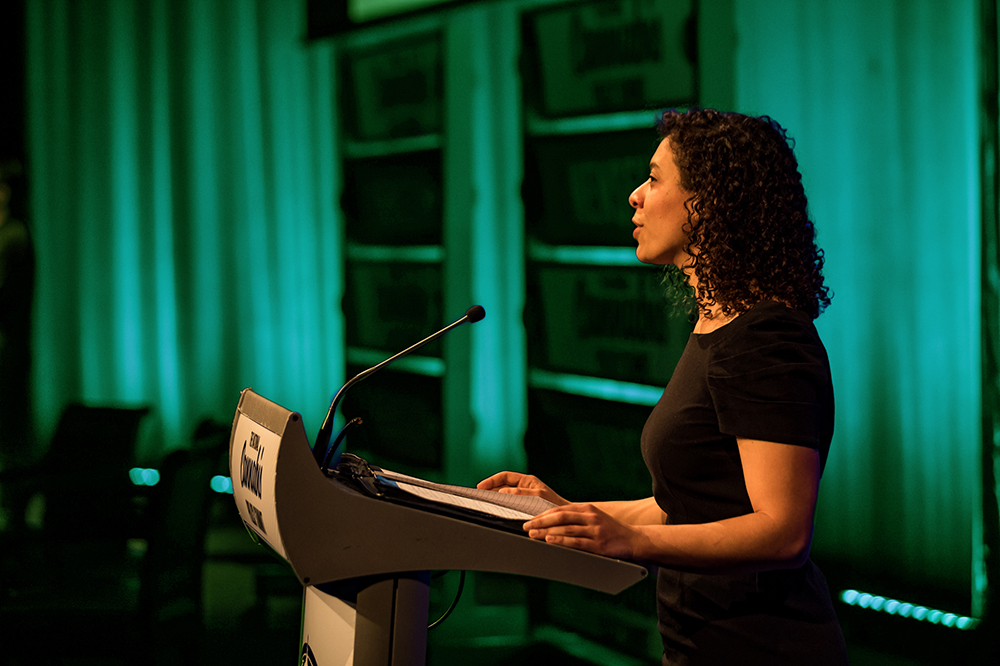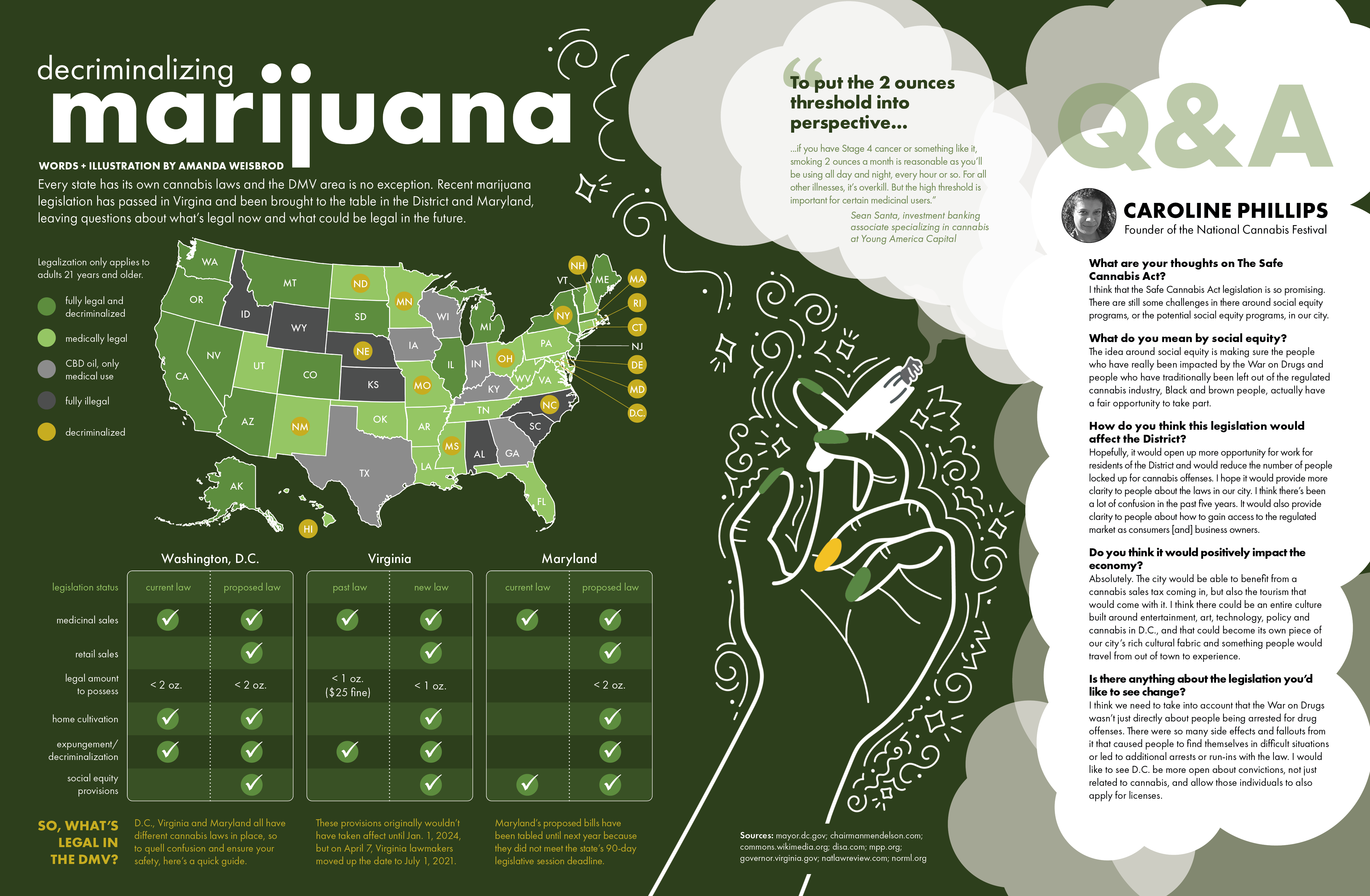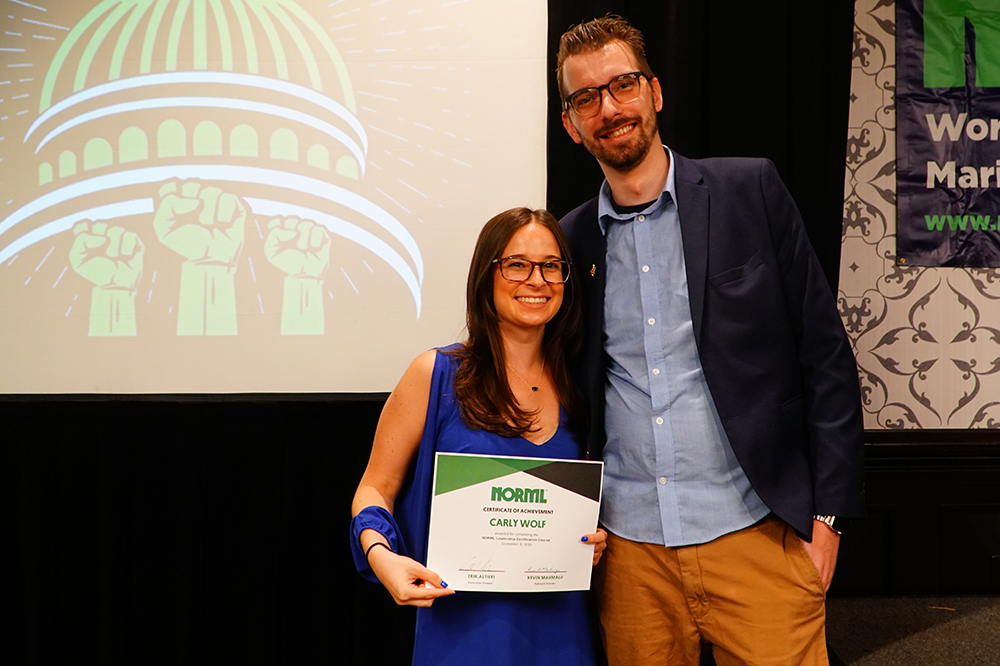Life
 Caroline Phillips. Photo courtesy of subject.
Caroline Phillips. Photo courtesy of subject.
The Green Issue: Experts + Advocates Make Case for Cannabis Legalization + Decriminalization
April 9, 2021 @ 10:00am
Two pieces of legislation regarding cannabis are currently circulating through the District’s system of government, both of which would include provisions to legalize recreational sales and establish social equity programs.
The current legislation, Initiative 71, which was passed in 2015, legalized recreational marijuana use for adults 21 and older with some key provisions.
Marijuana consumers may not possess any more than two ounces at one time, can only use marijuana on private property, may gift up to one ounce of marijuana to another person as long as it is not transactional and may grow up to six cannabis plants in their home — but no more than three of these plants can be mature at one time.
Marijuana has been available to purchase for medicinal use only at licensed dispensaries in the District since 2011.
If passed by the end of this year, The Safe Cannabis Act proposed by Mayor Muriel Bowser would legalize recreational sales at licensed dispensaries beginning on October 1, 2022. A 17% tax would be imposed on these sales, and part of this revenue would support reinvestments in communities most impacted by prohibition. The bill also includes automatic expungements for those who have prior marijuana offenses.
“This is about safety, equity and justice,” Mayor Bowser said in a press release. “Through this legislation, we can fulfill the will of D.C. voters, reduce barriers for entering the cannabis industry, and invest in programs that serve residents and neighborhoods hardest hit by the criminalization of marijuana.”
The second piece of legislation is the Comprehensive Cannabis Legalization and Regulation Act of 2021, which was introduced by six D.C. councilmembers in early March. As state and policy manager at NORML (the National Organization for the Reform of Marijuana Laws), a nonprofit public interest advocacy group focused on marijuana legalization, Carly Wolf favors this proposal over the Safe Cannabis Act. While they are fairly similar, this one is more “comprehensive” — hence the name.
“It’s a little more detailed on where the revenue would go and what kind of programs it would fund,” says Wolf, who, along with every source named in this article, believes social equity is the most important aspect of marijuana legalization.

National Cannabis Festival. Photo courtesy of Caroline Phillips.
Social equity, an idea traced back to the great philosophers Aristotle and Plato, is “rooted in the idea that each person is equal and has inalienable rights,” according to an academic article titled “Social Equity: Its Legacy, Its Promise.” In regards to cannabis legalization, Caroline Phillips, founder of the National Cannabis Festival, believes social equity means giving back to the communities that have been disproportionately impacted by the War on Drugs.
“Social equity, to me, is about transparency of process,” Phillips says. “It’s about making sure people have access, and it’s about fairness. Right now in the cannabis industry, we are really working state by state, if not city by city, to have legislators at the local level understand the impact a strong social equity program can have on the cannabis marketplace in their community, and why its something good for the longevity of the industry.”
Dating back to the late 1800s, America’s War on Drugs has disproportionately affected minority populations by associating cannabis consumption with Black and Latino communities, according to Morgan Fox, media relations director at the National Cannabis Industry Foundation.
“[This propaganda] was basically suggesting these groups were associated with violence, sexual assault and increased strength, or just a lot of racist tropes,” Fox says. “And some of those have carried on over the decades. I think [these tropes] have evolved a little bit, particularly in the eighties and nineties, to be more associated with laziness, inability to be successful professionally or personally, inability to have normal human relationships, and just generally being associated with a low moral character.”
Today, Black people are three times as likely to be arrested for marijuana-related offenses than their white counterparts, even though both groups consume marijuana at the same rate, according to a 2020 report published by the American Civil Liberties Union.
“The government used [the War on Drugs] as a way to target Black people [and] anti-war activists, and they couldn’t criminalize being Black so they criminalized marijuana use,” Wolf says. “It’s completely based on racist ideologies and I think those communities deserve to have much of the [tax] revenue. It’s crazy to me there are states profiting off of this, and then there are other states where people are literally sitting in jail for possession of a joint.”

Graphic by Amanda Weisbrod.
Corey Barnette, owner of Kinfolk Dispensary and District Growers, weighs in, noting that “there are parts of our communities that have been ravaged.”
“I believe we have a great opportunity if this legislation is introduced in a sane and considerate way,” he says. “We have an opportunity to repair some of that damage.”
Both the Safe Cannabis Act and the DC Council’s proposals include ways to repair some of the damage done by the War on Drugs including automatic expungement, broader access to marijuana licenses and funneling the tax revenue gained from regulated marijuana sales to affected communities.
“It should definitely be directed toward those communities to provide things like education, healthcare services, and other social programs that could help with those who are struggling with poverty and other detrimental effects of the drug war,” Wolf says. “I think that’s a really important part of any regulation plan: to direct some of that revenue to communities [who] need it the most.”
Specifically, the Comprehensive Cannabis Legalization and Regulation Act of 2021 outlines a provision to direct 50% of cannabis revenue into a Community Reinvestment Program Fund, which would fund grants to community-based organizations that address economic development, mental health treatment, substance use disorder treatment, non-law enforcement violence prevention services, homeless prevention services, reentry services, youth development and civil legal aid for underserved communities.
In addition to reparations and social equity, Phillips says legalizing and regulating a recreational marijuana market in the District has several beneficial outcomes including consumer safety provisions, employment opportunities and even the potential to boost the District’s tourism industry.
Bethany Moore at NORML points out that because there is no quality control in the illicit market, there is no guarantee that products have been tested for harmful chemicals or other substances.
“There’s so many reasons regulating and legalizing cannabis is safer,” she says. “In addition to the safety of the products, dispensaries check IDs [to prevent] underage consumption but the illicit market does not. So, it’s another preventative for youth to get access to a substance intended for adults.”

Carly Wolf + NORML Executive Director Erik Altieri. Photo courtesy of subject.
As a longtime D.C. resident and business owner in the District, Barnette says he’s been working heavily with the DC Council and the Mayor’s Office to offer input on how to properly provide social equity while building a healthy cannabis market. So far, he says both pieces of legislation address these concerns.
For Barnette, moving Kinfolk into the recreational cannabis market would allow the dispensary to have even greater participation and influence in its neighborhood, which is what they’re all about.
“Kinfolk really is a family,” he says. “It really is a business that looks to have an impact on the community around it. As a result of that, we definitely want to participate in any sort of adult use opportunities that present themselves.”
There’s a kind of kinship between marijuana consumers, Barnette explains, that creates a special bond of understanding and fosters community. By expanding recreational use and creating a more acceptable and open-air culture, he believes the negative perceptions and stigmas surrounding cannabis have the potential to change.
“Over the years as [Kinfolk has] been entrenched in Ward 6, we’ve really developed a family of customers and patients who come through our dispensary,” he says. “We focus more so on trying to provide a cannabis experience to people who want to engage in a cannabis lifestyle. If you are a user of cannabis, then you probably know there’s a little bit more kinship there when you find out that someone else is also a smoker or uses cannabis.”
In the end, Fox says the prohibition of cannabis “has been far more harmful to both individual consumers and society than cannabis itself has.” The legalization of a regulated market would not only provide a way forward to avoid future harm but also serve to repair some past injustices through social equity provisions.
“In broad strokes, prohibition doesn’t provide any sort of control over this substance and unfairly punishes people for consumption,” Fox adds. “I think there are all sorts of issues where our cannabis laws have caused serious harm that could be immediately alleviated by ending prohibition and sensibly regulating the substance.”
Check out this list of resources below to visit their websites and follow them on Instagram, and don’t miss the National Cannabis Festival’s Dazed & Amused Drive-In Party on Saturday, April 17 at the RFK Stadium Festival Grounds. Buy tickets at www.nationalcannabisfestival.com/drive-in-party.
District Growers: www.districtgrowers.com // @districtgrowers
The Executive Office of the Mayor: www.mayor.dc.gov // @mayor_bowser
Kinfolk Dispensary: http://kinfolkdispensary.com/links // @kinfolkdispensary
National Cannabis Festival: www.nationalcannabisfestival.com // @natlcannabisfest
National Cannabis Industry Foundation: www.thecannabisindustry.org // @nationalcannabisindustry
NORML: www.norml.org // @natlnorml
Don’t miss our virtual Cannabis City panel presented by District Fray and BĀkT DC on Thursday, April 29 from 6:30-7:30 p.m. Register here.
Enjoy this piece? Consider becoming a member for access to our premium digital content. Support local journalism and start your membership today.







